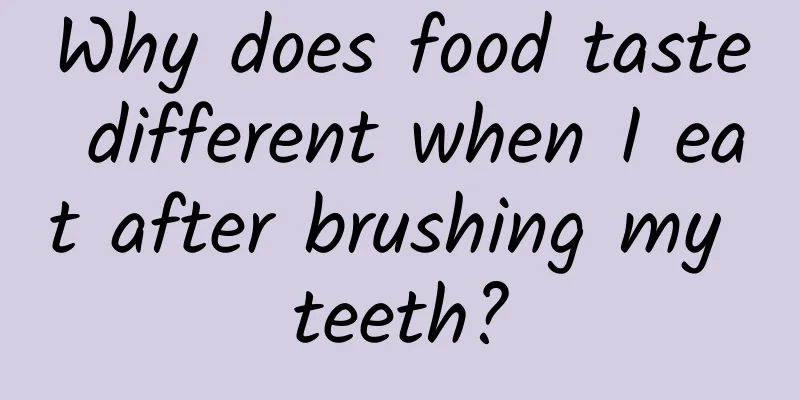Why does food taste different when I eat after brushing my teeth?

|
The first thing workers should do when they get up in the morning is to brush their teeth. But have you noticed that when you eat breakfast or drink a glass of freshly squeezed orange juice after brushing your teeth, you may feel that the taste is strange, and the originally sweet orange juice becomes very bitter. Copyright image, no permission to reprint Have you ever wondered why your orange juice tastes so funny? Is it because the juice has gone bad, or is there something wrong with your palate? What does our tongue look like? If you want to understand the principle of taste, you have to start with the structure of the tongue. You can look at your tongue in the mirror and see that there are many small "bumps" on the surface of the tongue. These bumps are called lingual papillae, and our taste receptors - taste buds - are all over the lingual papillae. Copyright image, no permission to reprint There are about 10,000 taste buds on the tongue of an adult, and each taste bud contains at least dozens of taste receptors. These tens of thousands of taste receptors allow us to feel the five tastes of sweetness, bitterness, umami, saltiness, and sourness. Among them, umami, sweetness, and bitterness are recognized by G protein-coupled receptors, while sourness and saltiness are recognized by ion channels. Schematic diagram of receptors on taste buds, source: drawn by the author When we eat or drink, small chemical molecules with flavor in the food will "wander around" in our mouth. These small molecules with different flavors are like different keys, and the taste receptors on the tongue are like different locks. Different keys are constantly matched with different locks in the mouth. Once the key successfully opens the lock, the taste receptors will send a series of signals to the brain, and we can feel the corresponding taste. Why does the taste change? Ordinary toothpaste contains a chemical called sodium laureth sulfate (SLS), which is a surfactant. Adding it to toothpaste can produce more foam when brushing teeth. The "culprit" that makes orange juice bitter after brushing teeth is sodium laureth sulfate in toothpaste. Copyright image, no permission to reprint The bitter taste in orange juice is caused by two small molecules, limonin and hesperidin. When we drink orange juice, the receptors on the taste buds that sense bitterness will accumulate phospholipid molecules, which is equivalent to the "keys" that sense bitterness being blocked. The bitter small molecules in orange juice cannot be inserted into these locks, so the bitterness we feel when drinking orange juice is not that strong. When brushing your teeth, the sodium lauryl sulfate in the toothpaste will decompose the phospholipid molecules on the receptors and clean the blocked "keys". Limonin and hesperidin can bind to the bitter receptors, so you will naturally feel a strong bitter taste. Do other foods also cause changes in taste? It is not just the sodium laureth sulfate in toothpaste that can change the sense of taste. The next magical fruit to be introduced, the miracle fruit (Synsepalum dulcificum), can also play a role in changing the sense of taste. The miracle fruit is a red berry native to the tropics. This magical berry was first discovered in Africa in 1725, when an explorer named Chevalier des Marchais noticed that the locals chewed the miracle fruit before eating, and eating the miracle fruit would change the taste buds and enhance the sweetness of food, especially those foods that are not sweet or sour. Later, researchers discovered the miracle fruit protein, Miraculin, in the miracle fruit, which can bind to the sweet receptors in the taste buds, making the food sweeter and changing the sourness of the food. So after you have eaten this miracle fruit, even drinking a spoonful of vinegar will be as sweet as drinking a spoonful of sugar water. Copyright image, no permission to reprint In addition, there is a phenomenon that changes the taste buds, which people call "pine mouth". This refers to the fact that some people will have a nauseating metallic taste in their mouths about 12 to 48 hours after eating pine nuts, just like holding a one-dollar coin in their mouths. This nauseating taste can last for several days or weeks. But so far, there is no reasonable explanation for the cause of pine nut mouth. Copyright image, no permission to reprint Is it okay to drink orange juice before brushing your teeth? Drinking orange juice before brushing your teeth may seem like a logical solution to the problem of orange juice becoming bitter, but if you do this, it will create new problems. Orange juice, coffee, and grapefruit juice can all be used as breakfast drinks, but they are highly acidic drinks that will temporarily soften and corrode the enamel on your teeth. If you brush your teeth immediately after drinking these drinks, it may cause your teeth to become sensitive or painful. Copyright image, no permission to reprint So, if you have the habit of eating breakfast before brushing your teeth, it is best to brush your teeth 30 minutes after breakfast! Seeing this, some people may ask, what should I do if I want to eat immediately after brushing my teeth, but I don’t want my taste to change? When will my taste return to normal after brushing my teeth? In fact, a toothpaste that does not contain sodium laureth sulfate has been developed on the market. After brushing your teeth with this toothpaste, you will not feel that orange juice has become bitter when you drink it. In addition, you can also try to drink more water to rinse your mouth or chew sugar-free gum to increase the flow of saliva, which will help "wash off" the sodium laureth sulfate on your tongue and restore your normal taste. References: 1.Munk M D. “Pine mouth” syndrome: cacogeusia following ingestion of pine nuts (genus: Pinus). An emerging problem?[J]. Journal of Medical Toxicology, 2010, 6(2): 158-159. 2.Swamy KB, Hadi SA, Sekaran M, et al. The clinical effects of Synsepalum dulcificum: a review[J]. Journal of medicinal food, 2014, 17(11): 1165-1169. 3. Bartoshuk LM, Gentile RL, Moskowitz HR, et al. Sweet taste induced by miracle fruit (Synsepalum dulcificum)[J]. Physiology & behavior, 1974, 12(3): 449-456. 4.Hooper SM, Newcombe RG, Faller R, et al. The protective effects of toothpaste against erosion by orange juice: studies in situ and in vitro[J]. Journal of dentistry, 2007, 35(6): 476-481. 5.ALLISON ANNMA, Chambers D H. Effects of residual toothpaste flavor on flavor profiles of common foods and beverages[J]. Journal of Sensory Studies, 2005, 20(2): 167-186. 6. https://www.foodauthority.nsw.gov.au/about-us/science/food-risk-studies/pine-nuts-and-pine-mouth 7.https://zh.wikipedia.org/wiki/%E5%91%B3%E8%95%BE Source: This article is produced by Science Popularization China, produced by Denovo, and supervised by China Science Popularization Expo This article has been authorized. Please contact the original author for reprinting. The cover image of this article is from the copyright gallery, and the image content is not authorized for reproduction |
<<: 【Creative Cultivation Program】Where is Newton's apple?
Recommend
Media Boss Private Domain Hot Sales Companion Camp-2nd Period
Media Boss Private Domain Hot Sales Companion Cam...
Why did Jack Ma personally start selling YunOS phones?
With Tencent launching TencentOS and reports that...
How much does it cost to create a fruit mini program in Qingyang?
How much does it cost to produce the Qingyang Fru...
Toutiao’s addictive data mining
Due to some irresistible forces, Toutiao 's p...
This kind of "fly" can not only be caught by hand, but also eaten
If there is a kind of "fly" that is lar...
How to optimize advertising creatives?
“It is as important to have a teacher as it is to...
Are crab sticks really the meat that falls off the crab? Should the plastic film on the surface be cooked together?
Winter is coming How can we miss hotpot? After a ...
After five years of "alone work", Zhang Heng-1 has expanded its global geophysical field and space environment perception and modeling capabilities
In order to promote the solution of the scientifi...
What is the secret to making the space station “sit like a clock and move like the wind”?
On July 24, the Wentian Experimental Module was s...
With fine atomization and 40 minutes of long battery life, the Mijia Supercharged Steam Garment Ironing Machine is only priced at 449 yuan in crowdfunding
Recently, cold air has been coming in waves. Duri...
Is the cost of joining the Jiamusi Beauty Mini Program high? Jiamusi Beauty Mini Program Franchise Fees and Process
How much does it cost to join a beauty mini progr...
Monthly sales of 1,419 units can make France the champion. Why does France, which has such a poor electric vehicle industry, target China?
All in all, China's automobile industry has s...
Xiaomi Cloud Service's 10 new features revealed: support for WeChat chat history backup
[[351698]] "Xiaomi Cloud Service" is a ...
Audi and Hyundai join forces to help the auto industry break away from the era of each taking care of its own business
Recently, foreign media reported that Audi announ...
[Case] How does an e-commerce app develop an operation and promotion strategy from scratch?
Through this article, you can learn how to formul...









